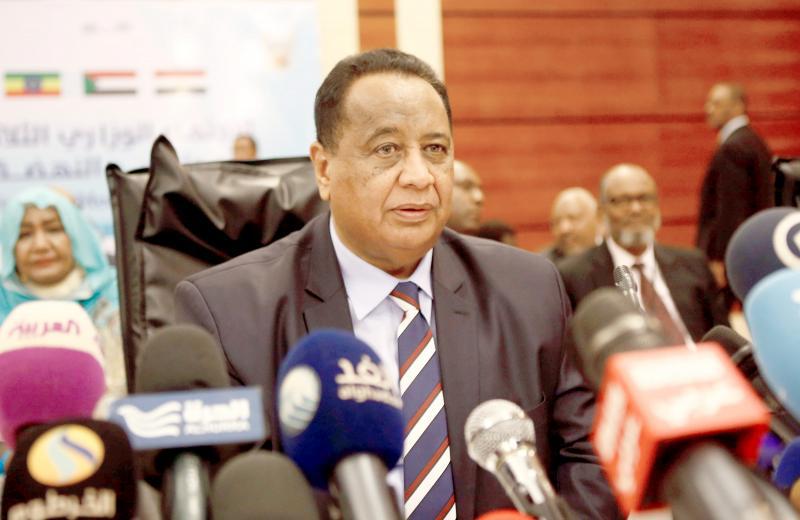Sudan would need a miracle to stay afloat
Sudan is going through a very bad economic crisis and a worse political one. With additional security threats, the country is at a critical stage.
This is not new for Sudan. The country has experienced these diseases for a long time. Each regime that has ruled Sudan has had its own approach to these problems. Most of the regimes fell because one of the three scourges spiralled out of control.
For 30 years, the regime of President Omar al-Bashir has evaded death but its future is far from clear due to the three same threats facing the country.
The extent of Khartoum’s crisis was revealed in the firing of Sudanese Foreign Minister Ibrahim Ghandour. He was relieved of his post after he spoke frankly about the Sudanese government’s inability to pay salaries of employees of the Sudanese diplomatic corps. This means the economic crisis is not only affecting average citizens but has reached the upper echelons of the state apparatus.
It appears the political situation in Sudan could crumble at any moment because of economic pressure. In a recent interview, Sadiq al-Mahdi, head of the National Umma Party, said: “Economic conditions in Sudan have deteriorated and it is just a matter of time before this government falls. How things will be after that and how they will end, I don’t know.”
Sudanese opposition forces issued calls for peaceful resistance to get the country out of what they termed “the crisis swamp.” They also called for “the establishment of a provisional authority to chart and execute a solution for the country’s economic crisis.”
The European Union halted all economic aid to Sudan due to the country’s lack of political reforms, disagreements between the various political forces and failure to meet international standards with political and economic laws.
The Sudanese regime had adopted many economic reforms but they have had negative consequences. Various economic cooperation agreements the regime made with international partners have not solved the problem. There is suspicion among Sudanese citizens that the international aid and grants have been misappropriated.
Al-Bashir had hedged his bets on international economic aid. Whenever necessary, he adjusted the country’s policies or simply implemented specific ones. He has irked many countries and entered many alliances based on economic interests. None of that has seemed to help.
He had hoped, for example, to get a share of the electricity generated by the Grand Ethiopian Renaissance Dam so he sided with Ethiopia and angered Egypt. To get closer to Saudi Arabia and hoping to attract more Saudi investment, he ordered the closure of all Iranian cultural centres in Sudan. Al-Bashir then moved closer to Qatar, hoping to receive more aid.
Finally, he offered Turkey the right to use the Sudanese island of Suakin in the Red Sea in exchange for numerous economic initiatives and without paying attention to the political and security fallout in the region.
In the end, however, none of al-Bashir’s manoeuvres could save him from the country’s economic woes.
They have become its pressure point. The United States secured Sudan’s cooperation in security matters in exchange for lifting economic sanctions that had been in place for about 25 years. The United States also promised to remove Sudan from its blacklist of terror-sponsoring states once political reforms were enacted.
Sudan’s international relations have become hostage to the country’s problems. It is not uncommon to see the country switch positions and sell out former friends and allies for economic aid.
Once a victim of exaggerated promises, a large portion of Sudanese society has lost hope for better conditions. How does al-Bashir respond? He carries out large-scale purges in state institutions. Internal security and public order have become his regime’s obsession.
Taking advantage of the situation, armed opposition forces in Sudan have reignited tensions in conflict zones in southern Kordofan, the Blue Nile and Darfur. They know the Sudanese armed forces are stretched to the limit trying to keep civil order and counter separatist movements.
The call for civil unrest by political opposition forces, however, has gone largely unanswered. The trouble with the opposition in Sudan is that it has lost its credibility with Sudanese citizens. Most citizens do not believe the opposition can become a viable alternative to the current regime. The opposition remains fractured and weak.
In most countries, politics and the economy are two sides of the same coin. When one weakens, the other is sure to follow. Such is the case in Sudan. For this reason, only a miracle can save Sudan from disintegrating.
This article was originally published in The Arab Weekly.







